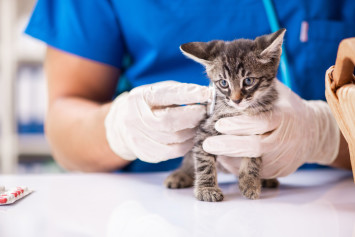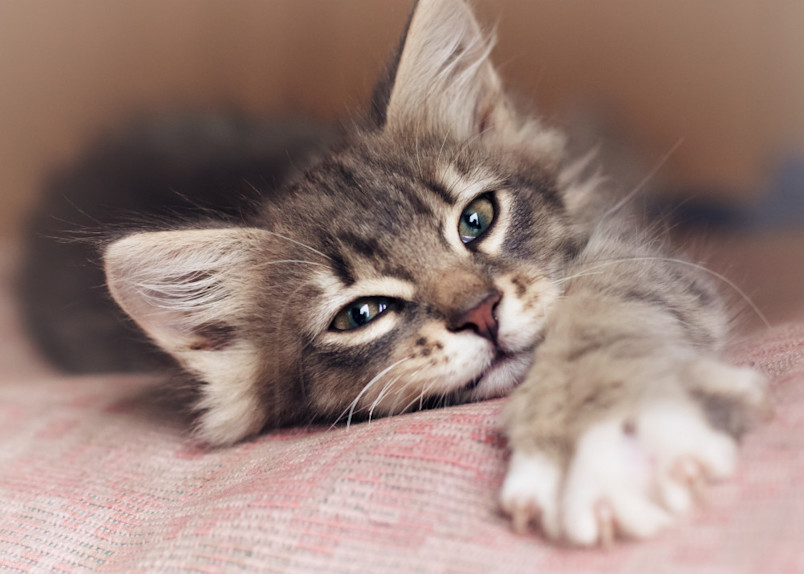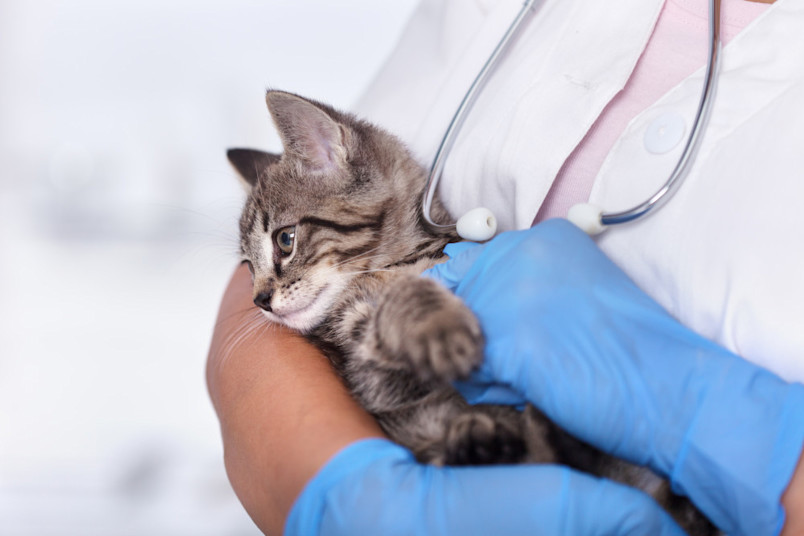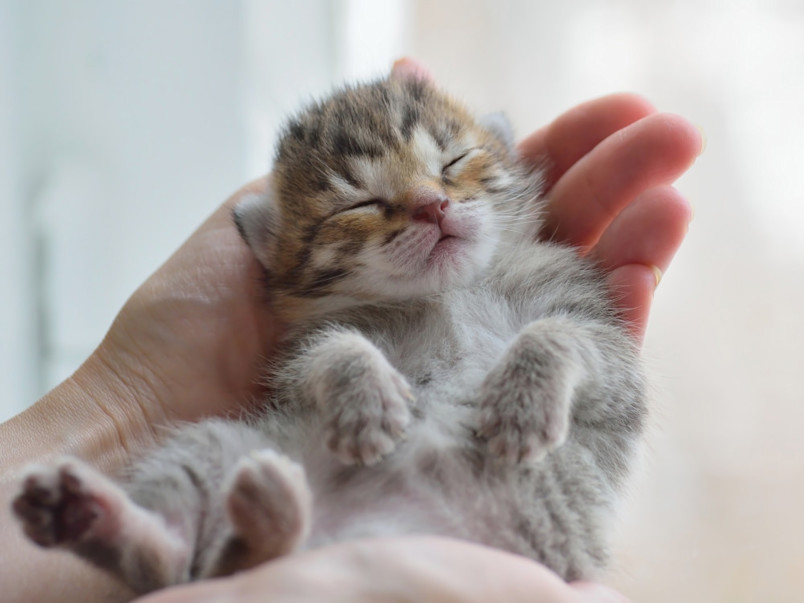
Those first tentative paw prints on soft carpet, the sleepy blink of eyes barely cracked open, the mewling purr that tugs at your heartstrings – witnessing a kitten's early days is nothing short of magical. But for all their adorable clumsiness, these tiny balls of fluff are embarking on a remarkable journey, transforming from helpless newborns into playful, independent felines. As a caretaker in this journey, you have a responsibility to ensure their health, happiness, and well-being. But don’t worry, we’re here to help you navigate every step of their journey and ensure that your little explorer blossoms into a happy, healthy cat.
When kittens are first born, they appear so small, weak and vulnerable, their eyes not even open yet. When do kittens open their eyes? Well, prepare for your heart to melt – within two weeks of life, those velvety lids start to flutter. Soon, they'll be gazing at you with wonder, their tiny pupils widening at every rustle and chirp, soaking in the sights and sounds of their new home. These fragile beings depend on us (and their moms too, of course) to take care of them, keeping them healthy and clean, especially when they are young. There’s not just one right answer when it comes to how to feed a kitten, how to bathe a kitten, how to care for a kitten, or how to vaccinate a kitten. Methods must be adapted for each individual kitten's needs.
The first six months of a kitten's life are a whirlwind of growth and discovery. It's a crucial period where their bodies and immune systems are rapidly developing, laying the groundwork for a healthy future. Vaccinations are essential to the development of their immune system. The immune system acts to protect our fur babies from a variety of contagious diseases. Vaccines help introduce the immune system to different bacteria and viruses that our kitties are at risk of being exposed to. This “pre-exposure” creates antibodies against the organisms in the vaccine and teaches the immune system how to fight them off in the event of future exposure. Vaccines are not one size fits all; the recommended vaccines for your pet can vary based on age, lifestyle and location.

When Do Kittens Get Vaccines?
With vaccination schedules beginning no younger than 6 weeks of age, you may wonder what will protect your kitten until then. Don’t fret—prior to vaccination, your kitten is protected by antibodies from their mother’s milk. This special milk, called colostrum, is full of protection from momma that lasts for several weeks. Over time these antibodies fade, but this happens at different intervals for each individual kitten. While the maternal antibodies are still present, they can actually hinder the kitten's ability to develop its own immune response to the vaccine. Therefore, vaccinations are strategically timed to "take over" once the maternal antibodies have weakened, ensuring seamless protection for your furry friend.
What Shots Do Kittens Need?
Vaccination is very important to helping your furry friend put their best paw forward when it comes to being protected from common, preventable diseases. The recommended vaccinations for kittens include FVRCP (Feline Viral Rhinotracheitis, Calicivirus and Panleukopenia), Rabies and FeLV (Feline Leukemia Virus).
Core Kitten Vaccinations
FVRCP is often referred to as an upper respiratory combo vaccine. This vaccine protects against three common viruses and can be administered as young at 6-8 weeks then is boostered 1-2 additional times at 4-week intervals. Afterwards, this vaccine is boostered every 1-3 years depending on the vaccine administered by your vet. This is considered a core vaccine for cats of all ages and lifestyles.
Rabies is a fatal but preventable viral disease. In most states, a Rabies vaccine is required by law because this disease is contagious to humans and can be fatal to them as well. The initial Rabies vaccination is administered around 12-16 weeks of age. The first vaccine must be boostered 1 year after initial vaccination, after which it is boostered every 1-3 years depending on the vaccine administered by your vet. This is considered a core vaccine for cats of all ages and lifestyles.
FeLV is a viral disease spread by feline saliva. Once contracted, it is not curable, so protecting your fur baby from the start is essential. Prior to vaccination, it is recommended that all kittens are tested for FIV/FeLV to ensure negative status. If positive, the vaccine is not necessary.
The FeLV vaccine is first administered around 12 weeks of age, then is boostered once 4 weeks later. The FeLV vaccine is considered core for kittens under one year of age due to age-related susceptibility and for cats over one year of age who are at risk. At risk individuals include those who live with an FeLV positive housemate or cats who go outdoors where exposure to cats of unknown FeLV status is unpredictable.

Non-core Cat Vaccinations
Bordetella is considered a non-core vaccine. It covers a single upper respiratory bacterial disease. This vaccine is given intranasally and is no longer common due to lack of complete coverage, but may be recommended for cats who frequently board, attend cat shows, or are in other multi-cat environments.
Kitten Vaccination Schedule Chart
Kitten Age | Recommended Schedule |
6-8 weeks | FVRCP, deworming, FIV/FeLV test |
9-12 weeks | FVRCP booster, FeLV, deworming |
12-16 weeks | FVRCP booster, FeLV booster, Rabies |
1 year of age | FVRCP, Rabies. (FeLV depending on risk) |
Budgeting for Kitten Shots
Of course we want our furry family members to be protected, but when it comes to kitten vaccinations, cost can be a question mark. Don't worry, we'll guide you through the ballpark figures and help you plan for your kitten's future! Keep in mind, kitten vaccination costs can vary depending on location, vet services, and individual needs.
On average, each round of kitten vaccines costs $50-$100. This usually includes a full exam by the veterinarian to ensure there is no evidence of birth defects or infectious diseases. Besides vaccinations, the other visit to consider putting in the budget when adopting a new kitten is for its spay or neuter. This surgical sterilization typically takes place at 4 to 6 months of age.
Getting your kitten insurance is a great way to be prepared for the financial responsibilities associated with caring for your precious feline. Getting your kitten insurance early before they could potentially develop uncovered pre-existing conditions is the best way to ensure you can cover their care.
Pet insurance does not cover preventative care like vaccines, but Embrace do offer non-insurance kitten wellness plans that can help you as an owner budget better for routine care—like vaccinations. It’s always better to be financially prepared for both the expected and unexpected when it comes to caring for your feline friend.

What to Expect with Kitten Vaccines
Just like with humans, kitten vaccinations can sometimes come with side effects. We hate to see our kitties experience any of these, but in most cases the benefit of disease prevention outweighs the low potential for side effects. Most side effects are considered mild, including fatigue, injection site pain or swelling and even a low-grade fever—like how we feel the day we get our flu or tetanus vaccines.
Occasionally, your kitten might experience moderate side effects like vomiting, diarrhea, or loss of appetite. But the good news is these usually resolve within 24 hours without needing any special treatment.
In rare cases, pets can actually have an allergic reaction to a vaccine. This typically manifests as facial swelling, hives over the body, difficulty breathing, or even going into shock, and usually occurs within a few hours of vaccine administration. Any of these symptoms constitute a medical emergency and require veterinary attention immediately. If this occurs during business hours, most primary care vets are equipped to administer appropriate care, but in the event this reaction occurs after hours you will need to take your baby to the emergency room for care. If your pet has an allergic reaction to a vaccine, it is important to figure out which vaccine they reacted to specifically, if possible, and take necessary precautions to prevent a reaction in the future.
Kitten Vaccinations for a Healthy Future
Remember, your kitten's health and happiness depend on you! Following their personalized kitten vaccination schedule, created by your veterinarian, is the best way to safeguard them from preventable diseases. Think of each tiny shot as a gentle nudge towards a healthy future, a future filled with playful pounces and purring contentment.
Don't forget, kitten wellness plans can be a great way to budget for these important visits and shots. They help spread out the cost, making it easier to ensure your little explorer gets the care they need to thrive. So cuddle close, soak in every sleepy snuggle and adorable meow, and watch your furry friend blossom into a healthy, happy cat for life. Enjoy every moment of the kitten stage, they grow up so fast!